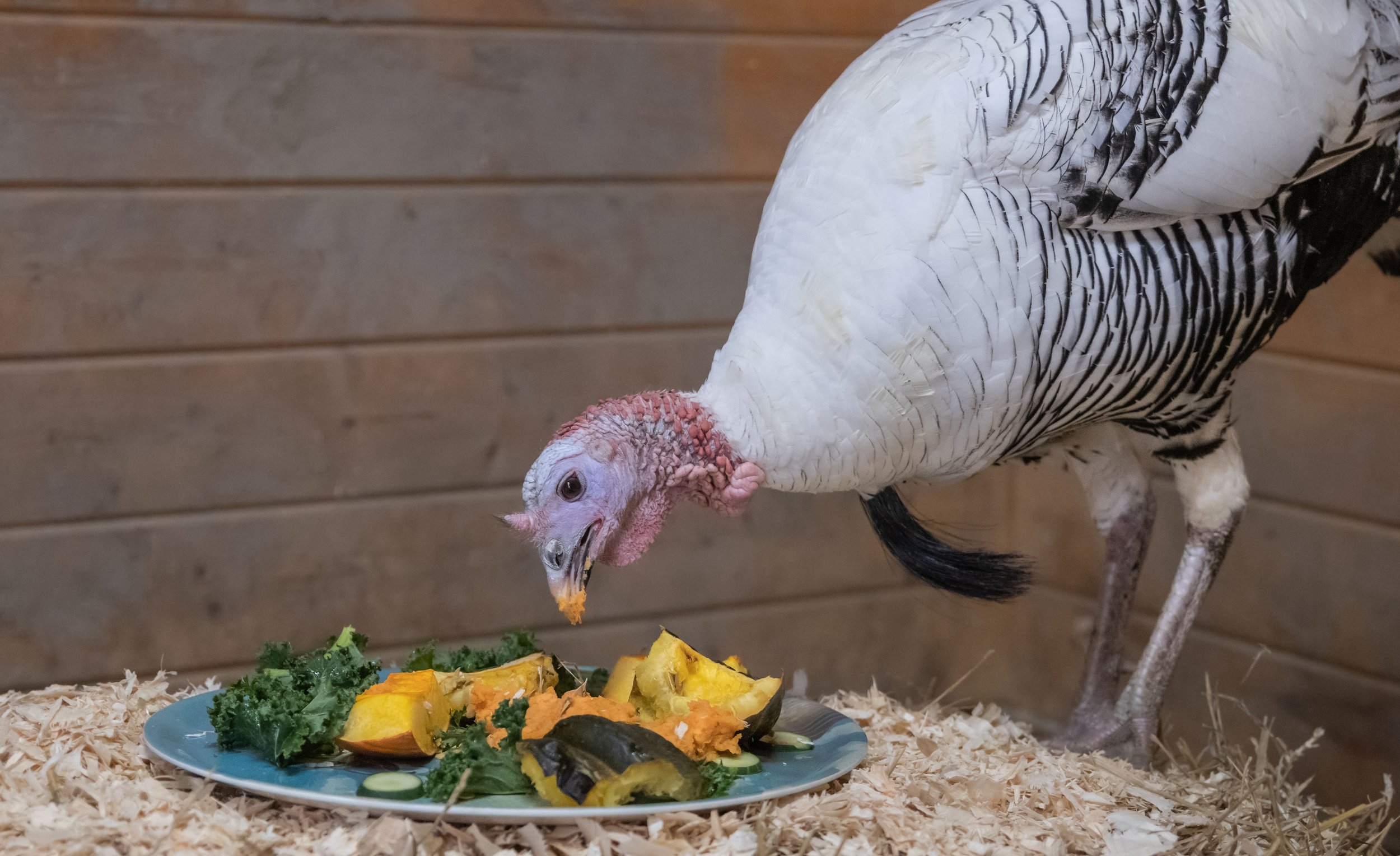Celebrate Compassionately This November
The approaching holiday season is a time to remember all we’re grateful for. At Barn we’re taking an extra moment to reflect on what our turkey residents mean to us and what the 46 million turkeys without sanctuary will be experiencing leading up to Thanksgiving.
We love caring for and spending time with the turkeys here, and we’ve found that they often end up dazzling and surprising our visitors as their new favorite species at Barn. And why not? Harper, Ben, Lewis, Hilda, and Sabrina have such smart, unique, and playful personalities. Turkeys are very social beings, create lifelong bonds with one another, and can be quite affectionate.
Tragically though, most people never get to see this side of turkeys. Around 300 million are raised in cruel conditions then slaughtered at just 5-7 months into their natural life expectancy of up to 10 years of age. Their limited days look nothing like the happy, carefree ones of Barn’s turkeys. Their home is with tens of thousands of other turkeys in large, windowless sheds where the stressful conditions result in many birds pecking at one another, plucking out feathers, and even attacking one another. To combat these behaviors, most turkeys have their beaks and tips of their toes sliced off in a very painful procedure with a hot blade. This takes away a critical part of being a turkey because they use their beaks daily to explore their environment.
In the 1970s, market weight for turkeys averaged 18 pounds; today that average has increased to 28 pounds. This genetic breeding within the industry to make turkeys gain weight rapidly causes trauma to their internal organs and broken legs or limb deformities. In fact, male turkeys are now so heavy they cannot mate naturally. All turkeys killed for food are the products of artificial insemination. Baby turkeys are hatched in large incubators where they will never see their mothers and must huddle around a heat lamp for warmth. Our girls Sabrina, Hilda, and Zelda suffered from thermo burn injuries, most likely from heating lamps used to force egg production. Sadly, Zelda passed from her injuries after finally experiencing kindness during her brief time with us at Barn.
And it’s not just the turkeys who suffer from this system, but humans as well. To stimulate growth and combat the filthy conditions they are raised in, turkeys are dosed with antibiotics, which can cause antibiotic resistance in those who consume them. The USDA estimates that 80% of all antibiotics in the U.S. are given to farmed animals and this dependence on antibiotics to mitigate the effects of their crowded living conditions is thought to be a major reason for the rise in bacterial infections in humans that are resistant to antibiotics.
These antibiotics, along with nitrogen, phosphorus, hormones, and other toxins to our health and the environment end up in local water supplies through turkey manure runoff. Local air quality is affected by poisonous gasses and heavy dust particles that pollute the air.
With the harm being done to these intelligent, sensitive birds, the health risks we take as humans, and the damage done to the environment, we encourage everyone to join us in a more compassionate holiday this year. We can choose to celebrate life and start new traditions that leave cruelty off the plate by feasting on delicious plant-based foods instead. Happy holidays to you, Barn family.
Meet the Turkeys!
Store-Bought Roasts
Upton’s Naturals Vegan Holiday Roast Slices in Gravy
365 Whole Foods Market Meatless Plant-Based Roast with Gravy
Hazelnut Cranberry Roast en Croûte by Field Roast
Sage & Garlic Celebration Roast by Field Roast
Celebration Roast with Traditional Bread Stuffing and Porcini Mushroom Gravy by Field Roast
Savory Stuffed Turk’y by Gardein
Holiday Roast by Gardein
Tofurky Roast by Tofurky
Turkeyless Stuffed Roast with Gravy by Trader Joe’s
Homemade Roasts
School Night Vegan - Vegan Turkey Roast
It Doesn't Taste Like Chicken - Best Vegan Turkey Roast (perfect for Thanksgiving)


